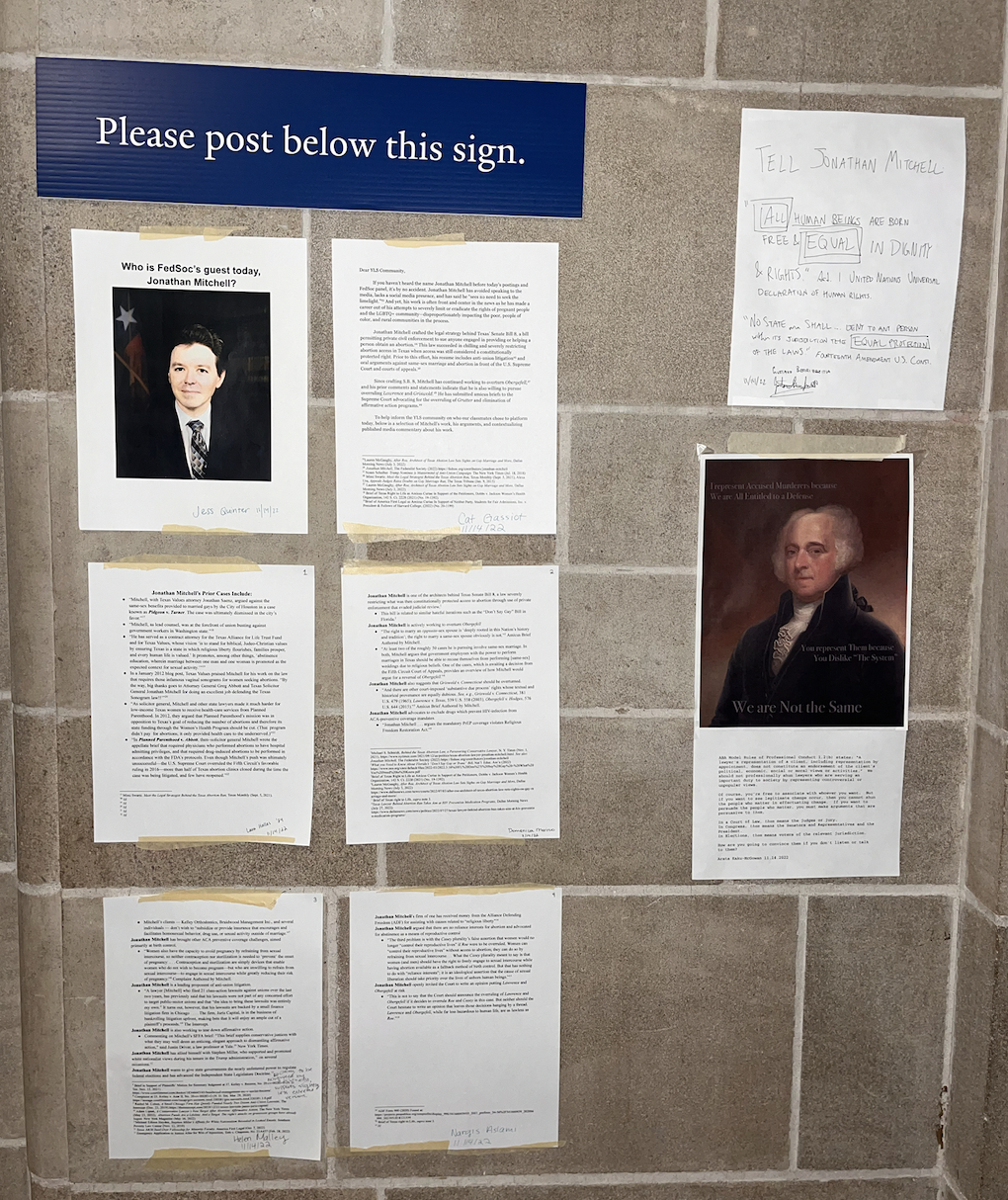Yale Law Federalist Society hosts Jonathan Mitchell, students put up posters voicing concerns
One of the architects of the Texas Heartbeat Act visited campus for a conversation on “originalism and the fourteenth amendment” on Nov. 14.

Ines Chomnalez, Contributing Photographer
One of the hallways in Yale’s Sterling Law Building is embossed with a nondescript fixture reading “Please post below this sign.”
The granite wall, covered completely in duct-taped statements, open letters and pictures, is known by students at the Law School as “The Wall.” Currently taking the spot immediately below the sign is an 8.5 x 11 print-out of a poorly lit headshot captioned “Who is FedSoc’s Guest today, Jonathan Mitchell?”
“To help inform the YLS community on who our classmates choose to platform today, below is a selection of Mitchell’s work, his arguments, and contextualizing published media commentary about his work,” reads a letter addressed to the YLS community taped next to the headshot.
The headshot and letter, along with seven additional pieces of material directly and indirectly pertaining to Mitchell, were taped up on Nov. 14 when the Yale Law Federalist Society hosted a discussion on “Originalism and the Fourteenth Amendment.”
The talk featured Jonathan Mitchell in conversation with Yale Law Professor Akhil Reed Amar ’80 LAW ’84 in conversation. Mitchell, who served as the Solicitor General of Texas until 2015, is credited with devising the legal mechanism behind the Texas Heartbeat Act, which bans abortion after the detection of embryonic cardiac activity.
“There was a lot of energy among the students,” Amar said. “But I would say it was positive energy. People were very interested in joining the conversation and it was a high level conversation worthy of the Law School.”
In an invitation sent to students by the Federalist Society, the group overviewed Mitchell’s legal career, referencing his experience as Solicitor General, his work on the enforcement mechanism behind the Texas Heartbeat Act, and his recently submitted amicus brief in the SFFA v. Harvard Case.
One key point highlighted by students on the Wall, and omitted in FedSoc’s invitation, was Mitchell’s contributions to legal movements opposing same-sex relationships and marriage. Students specifically highlighted his stance on the constitutional protection of same-sex marriage under Obergefell v. Hodges and Lawrence v. Texas.
“Jonathan Mitchell openly invited the Court to write an opinion putting Lawrence and Obergefell at risk,” one of the Wall postings states.
In a phone call with the News, Professor Amar explained that same-sex marriage was a key point of contention between himself and Mitchell during the talk.
He described the event as “akin to a debate” and explained that he was approached by the Federalist Society to participate in October, after Mitchell expressed interest in having Amar contribute as a faculty interlocutor. Amar also shared that the event was at full capacity.
“We didn’t agree on all sorts of things,” Amar said. “But I think it was very polite and cordial. And I didn’t hold back and he defended his ground.”
According to Amar, the conversation touched minimally upon Mitchell’s contributions to the Texas Heartbeat Act and focused much more around his stances on same-sex marriage and Brown v. Board of Education.
Amar and students who attended the event remarked that students who disagreed with Mitchell posed their questions respectfully at the end of the discussion.
“That’s what my own take is, it’s what we’re supposed to do,” Amar said. “On campus, we’re supposed to hear different ideas, and vigorously debate them.”
The nine papers posted on Nov. 14 are comprised of Mitchell’s headshot, the open letter to YLS students, a list of Mitchell’s previous cases, 3 pages detailing a total of 12 positions held by Mitchell, a handwritten statement asking students to tell Jonathan Mitchell “All human Beings are Born Free & Equal in Dignity & Rights,” a poster of Jonathan Adams, and a quote from the American Bar Association’s Rules of Professional Conduct.
Community members, including those involved in planning the event, looked favorably upon how students opposing Mitchell’s opinions expressed their disagreements.
“Credit not only goes to the Federalist Society for organizing the event but also to liberal students and student groups for engaging respectfully with a speaker they strongly opposed,” Davis Parker, a member of Yale Federalist Society, wrote in an email to the News. “Rather than protest disruptively, they used the Wall and Q-and-A opportunities to press their points and ask tough questions.”
Among the 12 bullet points about Mitchell listed on the wall are his advocacy for abstinence as a means of reproductive control, his personal ‘alliance’ with Stephen Miller who “supported and promoted white nationalist views during his tenure in the Trump administration” and his one-person firm’s acceptance of Alliance Defending Freedom money.
“The Wall is really for the students,” Amar said when asked about student reaction to the event. “So I don’t know much about that.”
The climate around free speech for students at YLS received widespread media attention last Spring, when an event featuring general counsel to the ADF, a Southern Poverty Center recognized Hate Group, was interrupted by protestors. The Wall was introduced as a replacement for the student-only Listserv, which was disbanded in June following backlash around the aforementioned protest.
In an email announcing the disbanding of the student Listserv, Yale Law School Dean Heather Gerken expressed hope that the forum would help students, “take time to reflect before posting, a habit that lawyers and members of a scholarly community must practice.”
The News reached out to multiple students who signed postings on the Wall for this article, all of whom either declined or did not respond to requests for comment. The Yale Law press office also declined to comment.
Yale Law was founded in 1824.







